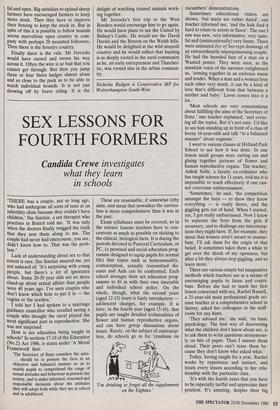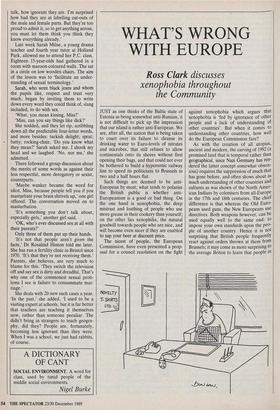SEX LESSONS FOR FOURTH FORMERS
Candida Crewe investigates
what they learn in schools
`THERE was a couple, not so long ago, who had undergone all sorts of tests at an infertility clinic because they couldn't have children,' Ilse Sinclair, a sex therapist who practises in Bristol told me. 'It was only when the doctors finally twigged the truth that they sent them along to me. The couple had never had intercourse, you see, didn't know how to. That was the prob- lem.'
Lack of understanding about sex to that extent is rare, Ilse Sinclair assured me, yet not unheard of. 'It's surprising with young people, but there's a lot of ignorance about. Some 20-30 year olds are no more clued-up about sexual affairs than people were 40 years ago. I've seen couples who don't know which hole to put it in — the vagina or the urethra.'
I told her I had spoken to a marriage guidance councillor who recalled seeing a couple who thought the navel played the most significant part in reproduction. She was not surprised. How is sex education being taught in schools? In sections 17-19 of the Education (No.2) Act 1986, it states under 'A Moral Framework' that:
`The Secretary of State considers the aims- . . . should be to present the facts in an objective and balanced manner so as to enable pupils to comprehend the range of sexual attitudes and behaviour in present day society, and to make informed, reasoned and responsible decisions about the attitudes they will adopt both while they are at school and in adulthood.
These are reasonable, if somewhat lofty aims, and mean that nowadays the curricu- lum is more comprehensive than it was in the past.
Exam syllabuses must be covered, so in the science lessons teachers have to con- centrate as much as possible on sticking to the clinical, biological facts. It is during the periods devoted to Pastoral Curriculum, or PC, (a personal and social education prog- ramme designed to equip pupils for normal life) that topics such as homosexuality, contraception, sexually transmitted • dis- eases and Aids can be confronted. Each school arranges their sex education prog- ramme to fit in with their own timetable and individual school policy. On the whole, though, what the second years (aged 12-13) learn is fairly introductory — adolescent changes, for example. It is later, in the fourth year (aged 15-16), that pupils are taught detailed technicalities of flower and human reproductive organs, and can have group discussions about issues. Rarely, on the subject of contracep- tion, do schools go in for 'condoms on `I'm drinking to forget all the supplements on the Eighties.' cucumbers' demonstrations.
Sometimes educational videos are shown, 'but many are rather dated', one teacher informed me, 'and the kids find it hard to relate to actors in flares'. The one I saw was new, very informative, very taste- ful and (unintentionally) very funny. There were animated Joy of Sex-type drawings of an extraordinarily unprepossessing couple. He had the bearded face of a man on a Wanted poster. They were seen, as the mawkish voice of the narrator enlightened us, 'coming together in an embrace warm and tender. When a man and a woman love each other very much, it can be a kind of love that's different from that between a mother and baby.' Loves comes into it a lot.
`Most schools are very conscientious about fulfilling the aims of the Secretary of State,' one teacher explained, 'and cover- ing all the topics. But it's not easy. I'd like to see him standing up in front of a class of horny 16-year-olds and talk "in a balanced manner" about orgasms.'
I went to various classes at Holland Park School to see how it was done. In one lesson small groups were cutting out and gluing together pictures of flower and human reproductive organs. The teacher,, Ashok Sethi, a faculty co-ordinator who has taught science for 11 years, told me it is impossible to teach effectively if one can- not overcome embarrassment.
`Sometimes,' he said, 'the competition amongst the boys — to show they know everything — is really fierce, and the giggling gets out of hand. When I started, yes, I got really embarrassed. Now I know to separate the boys from the girls if necessary, and to challenge any misconcep- tions they might have. If, for example, they shout that women aren't meant to mastur- bate, I'll ask them for the origin of that belief. It sometimes takes them a while to get over the shock of my openness, but after a bit they always stop giggling, and so learn more.'
There are various simple but imaginative methods which teachers use as a means of encouraging pupils to listen and contri- bute. Before she had to teach her first lesson concerned with sex, Rachel Russell, a 25-year-old main professional grade sci- ence teacher at a comprehensive school in Surrey, asked her colleagues in the staff- room for any hints.
`They advised me,' she said, 'on basic psychology. The best way of discovering what the children don't know about sex, is to ask them to write questions anonymous- ly on bits of paper. Then I answer them aloud. Their peers can't tease them be- cause they don't know who asked what.'
Today, having taught for a year, Rachel works by experience and instinct, and treats every lesson according to her rela- tionship with the particular class.
`It's with the fourth years that you have to be especially tactful and appreciate their position. It's amazing, despite their big talk, how ignorant they are. I'm surprised how bad they are at labelling cut-outs of the male and female parts. But they're too proud to admit it, so to get anything across, you must let them think you think they know everything already.'
Last week Sarah Milne, a young drama teacher and fourth year tutor at Holland Park, allowed me to attend her P.C. class. Eighteen 15-year-olds had gathered, in a room with maroon-coloured walls. The sat in a circle on low wooden chairs. The aim of the lesson was to 'facilitate an under- standing of sexual terminology.'
Sarah, who wore black jeans and whom the pupils like, respect and trust very much, began by inviting them to write down every word they could think of, slang included, to do with sex.
`What, you mean kissing, Miss?'
`Miss, can you say things like dick?'
She nodded, and they let rip, scribbling down all the predictable four-letter words, and more besides: turkish delight; sprat; batty; rocking-chair. `Do you know what they mean?' Sarah asked me. I shook my head and we laughed. 'No, nor me,' she admitted.
There followed a group discussion about the merits of some words as against their less respectful, more derogatory or sexist, countrparts.
`Maybe wanker became the word for idiot, Miss, because people tell you if you masturbate your brain shrivels up,' one girl offered. The conversation moved on to masturbation.
`It's something you don't talk about, especially girls,' another girl said.
`OK, who's ever discussed sex at all with their parents?'
Only three of them put up their hands.
`It's not that people aren't given the facts,' Dr Rosalind Hinton told me later. She has run a fertility clinic in Bristol since 1970. 'It's that they're not receiving them.' Parents, she believes, are very much to blame for this. 'They switch the television off and say sex is dirty and dreadful. That's why one of the commonest sexual prob- lems I see is failure to consummate mar- riage.'
She deals with 20 new such cases a year. `In the past,' she added, 'I used to be a visiting expert at schools, but it is far better that teachers are teaching it themselves now, rather than someone peculiar. The didn't bring in strangers to teach geogra- phy, did they? People are, fortunately, becoming less ignorant than they were. When I was a school, we just had rabbits, of course.











































































































 Previous page
Previous page